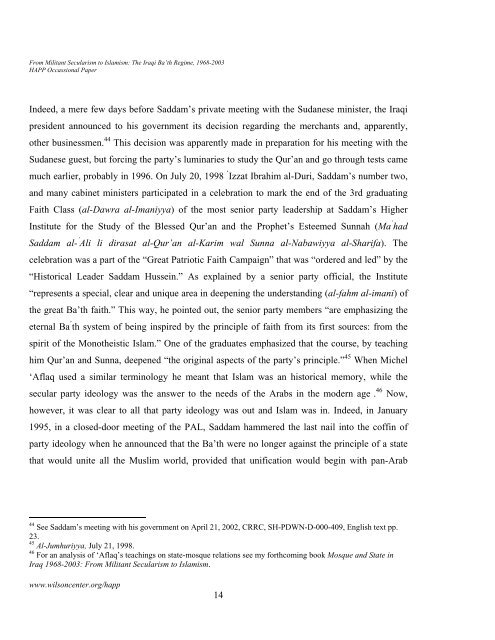From Militant Secularism to Islamism
From Militant Secularism to Islamism
From Militant Secularism to Islamism
You also want an ePaper? Increase the reach of your titles
YUMPU automatically turns print PDFs into web optimized ePapers that Google loves.
<strong>From</strong> <strong>Militant</strong> <strong>Secularism</strong> <strong>to</strong> <strong>Islamism</strong>: The Iraqi Ba’th Regime, 1968-2003<br />
HAPP Occassional Paper<br />
Indeed, a mere few days before Saddam’s private meeting with the Sudanese minister, the Iraqi<br />
president announced <strong>to</strong> his government its decision regarding the merchants and, apparently,<br />
other businessmen. 44 This decision was apparently made in preparation for his meeting with the<br />
Sudanese guest, but forcing the party’s luminaries <strong>to</strong> study the Qur’an and go through tests came<br />
much earlier, probably in 1996. On July 20, 1998 ‘ Izzat Ibrahim al-Duri, Saddam’s number two,<br />
and many cabinet ministers participated in a celebration <strong>to</strong> mark the end of the 3rd graduating<br />
Faith Class (al-Dawra al-Imaniyya) of the most senior party leadership at Saddam’s Higher<br />
Institute for the Study of the Blessed Qur’an and the Prophet’s Esteemed Sunnah (Ma ’ had<br />
Saddam al- ’ Ali li dirasat al-Qur’an al-Karim wal Sunna al-Nabawiyya al-Sharifa). The<br />
celebration was a part of the “Great Patriotic Faith Campaign” that was “ordered and led” by the<br />
“His<strong>to</strong>rical Leader Saddam Hussein.” As explained by a senior party official, the Institute<br />
“represents a special, clear and unique area in deepening the understanding (al-fahm al-imani) of<br />
the great Ba’th faith.” This way, he pointed out, the senior party members “are emphasizing the<br />
eternal Ba ’ th system of being inspired by the principle of faith from its first sources: from the<br />
spirit of the Monotheistic Islam.” One of the graduates emphasized that the course, by teaching<br />
him Qur’an and Sunna, deepened “the original aspects of the party’s principle.” 45 When Michel<br />
‘Aflaq used a similar terminology he meant that Islam was an his<strong>to</strong>rical memory, while the<br />
secular party ideology was the answer <strong>to</strong> the needs of the Arabs in the modern age . 46 Now,<br />
however, it was clear <strong>to</strong> all that party ideology was out and Islam was in. Indeed, in January<br />
1995, in a closed-door meeting of the PAL, Saddam hammered the last nail in<strong>to</strong> the coffin of<br />
party ideology when he announced that the Ba’th were no longer against the principle of a state<br />
that would unite all the Muslim world, provided that unification would begin with pan-Arab<br />
44 See Saddam’s meeting with his government on April 21, 2002, CRRC, SH-PDWN-D-000-409, English text pp.<br />
23.<br />
45 Al-Jumhuriyya, July 21, 1998.<br />
46 For an analysis of ‘Aflaq’s teachings on state-mosque relations see my forthcoming book Mosque and State in<br />
Iraq 1968-2003: <strong>From</strong> <strong>Militant</strong> <strong>Secularism</strong> <strong>to</strong> <strong>Islamism</strong>.<br />
www.wilsoncenter.org/happ<br />
14


